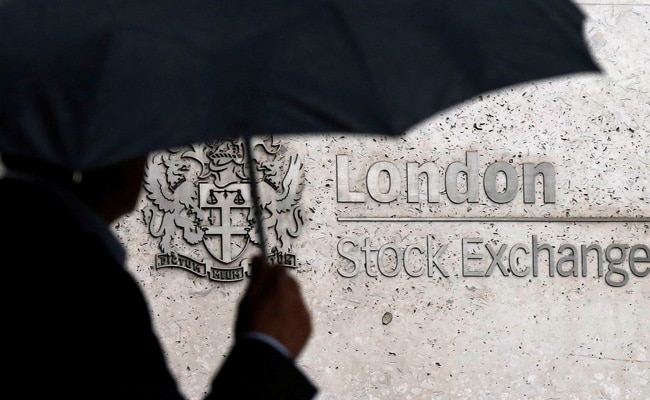

London is no longer Europe’s biggest stock market. (File)
It’s been a dramatic year for UK markets.
The onset of a recession, inflation at a 41-year high, two prime ministers resigning and the highest number of strikes since Margaret Thatcher in the 1980s have helped trigger selloffs in domestic stocks and both government and corporate debt.
The rout in many assets has come as Britain faces a potentially harsher cost-of-living crisis than other developed economies. That’s partly due to increases in a household-energy price cap as well as shorter-term mortgage payments being more sensitive to rising central bank rates. Brexit, meanwhile, continues to cause supply chain snags for companies.
In total, about £550 billion ($672 billion) of market value has been shaved off indexes tracking locally-exposed shares and bonds.
“It’s been a really difficult year,” Anna Macdonald, a UK small-cap equities Edinburgh-based fund manager at Amati Global Investors, said by phone. “Valuations are reflecting quite a poor picture.”
Here’s a breakdown of what happened in UK markets this year:
London De-Throned
This was the year that the UK lost its crown as Europe’s biggest stock market. The combined market capitalization of primary listings in Paris – excluding ETFs and ADRs – was $2.97 trillion as of Dec. 15 versus London’s $2.95 trillion, according to data compiled by Bloomberg.
And it wasn’t just France that toppled London: India and Saudi Arabia overtook the UK as well. Saudi Arabian stocks benefited this year as Brent crude reached a peak of nearly $140. Saudi Arabian Oil Co., also known as Saudi Aramco, comprises more than half of the exchange’s market capitalization and is the third-largest company in the world.
Indian firms have benefited from access to cheaper Russian crude, according to Nick Payne, investment manager in emerging market equities at Jupiter Asset Management.
Pound’s Turbulent Year
UK markets experienced bouts of high volatility in late September as then Prime Minister Liz Truss and Chancellor of the Exchequer Kwasi Kwarteng announced a raft of unfunded tax cuts in their so-called mini budget.
The announcement roiled markets as investors fretted over the increase in government borrowing that would be required to fund the policies. The pound fell to an all-time low against the dollar of $1.0350 and, despite subsequently rebounding as Rishi Sunak replaced Truss as prime minister, is still poised for its biggest annual drop since 2016.
“The image of the UK has been tarnished by Brexit, by the political turmoil and the episode we saw in September,” said Chris Iggo, chief investment officer of AXA Investment Managers Core unit.
Gilt Yields Spike
UK benchmark 10-year yields have surged over two percentage points this year, the most since 1994. That’s as the Bank of England raised interest rates at the fastest pace in more than three decades to put a lid on double-digit inflation.
And while yields have eased since the mini budget, “perceptions of fiscal credibility have not fully recovered,” said BlackRock Inc. strategists in their 2023 outlook.
Corporate Debt Drought
Many sterling bond sales were put on hold through the various bouts of this year’s volatility, with no deals in the two weeks after the mini-budget and the ensuing liability-driven investing (LDI) crisis that required a BOE intervention.
At about £115 billion including gilts, issuance dropped to the lowest level since 2018, a time when investors were spooked by the UK’s struggles to secure a Brexit deal.
FTSE 100’s Moment
The more international FTSE 100 stood out as a bright spot, meanwhile, after underperforming since the UK voted in 2016 to leave the European Union, partly due to a lack of “growth stocks” in areas like technology.
The weak pound benefited exporters, while buoyant commodities prices spurred gains for the likes of Glencore Plc and Shell Plc. Non-cyclical sectors such as staple goods and healthcare further bolstered the FTSE, as investors sought havens during the economic downturn.
The FTSE 100 is the best-performing major developed market this year in local-currency terms, while being down 11% in US dollars, and is headed for its biggest outperformance versus euro-area peers since 2011.
Domestic Stock Doom
UK stocks’ outperformance has been limited to the bluechips. The FTSE 250 midcap index and another benchmark that tracks domestic-focused shares, the FTSE Local UK Index, are both down more than 20% year-to-date, the most since the 2008 global financial crisis. Worries about Britain’s economy, surging interest rates and the aftermath of Brexit have hammered sectors like homebuilding, banking, real estate investment and retail.
Still, the dynamic for UK stocks could shift next year, according to Susana Cruz, a strategist at Liberum Capital Ltd. She expects British midcaps to outperform large caps as inflation eases and the dollar weakens.
Shrinking IPO Share
It’s not just on market value that London is losing ground. While it was a bad year for IPOs globally, the UK capital’s share of proceeds from European initial public offerings has fallen to the lowest since 2009. According to data compiled by Bloomberg, listings in London have raised just £1.5 billion this year, accounting for 9% of the European total.
London hasn’t had a single billion-dollar-plus IPO this year, and only five deals raised over $100 million.
(Except for the headline, this story has not been edited by NDTV staff and is published from a syndicated feed.)
Featured Video Of The Day
Arvind Kejriwal’s “Everything Is Fine” Jab At BJP Over Chinese Aggression






